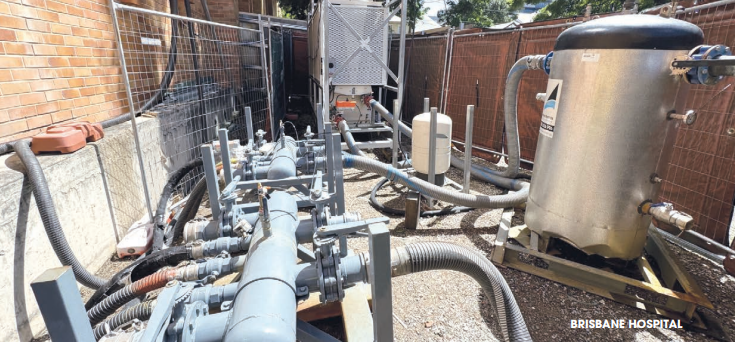Location: Queensland | Sector: Healthcare
The Challenge
A private hospital in Brisbane was facing a delayed opening of its new operating theatres due to the late delivery of its new permanent chiller plant. This delay prevented elective surgeries from being performed, surgeries that had been booked months in advance. In addition to this, site space constraints made it difficult to place a temporary chiller, as it needed to be installed on the same concrete pad where the permanent chiller would eventually be placed. Minimising downtime during the changeover was critical. Moreover, the temporary chiller had to be located within 25 meters of residential areas, requiring careful management of noise levels.
Product
1 x 200kW air-cooled heat pump chiller
Additional capacity with a chilled water bypass for system control
120m of chilled water lines with piping fittings and adapters
160m of temporary electrical cables for the pump and chiller
Turnaround Time
12 hours
Duration
4 weeks initially
Project Steps
Assessment • Engineering
Deployment • Installation
Commissioning • Operation
Demobilisation
Project Highlights
Traffic management during installation and removal
Early morning crane truck deliveries to minimise disruption
Security fencing with Eco Barrier for noise control
Remote Monitoring System
The Solution
EVALUATION AND ENGINEERING
Aircon Rentals was tasked with designing and implementing a solution that could meet the hospital’s cooling needs. With space limitations and noise considerations, the system needed to be both efficient and quiet. Aircon Rentals selected a 200kW air-cooled heat pump chiller and associated accessories to meet these requirements. The additional cooling capacity and the inclusion of a chilled water bypass ensured optimal system control. Planning for the installation, rigging, commissioning and removal required special consideration.
DEPLOYMENT AND INSTALLATION
To address the logistical challenges of the installation, Aircon Rentals organised early morning crane truck deliveries to transport the chillers and equipment safely and efficiently. By working closely with the hospital and coordinating with the hospital’s project team, the equipment was successfully placed and secured on-site. Aircon Rentals also installed security fencing with Eco Barrier technology, which served both to secure the area and to reduce breakout noise from the chiller and pump. The installation was completed on schedule with minimal impact on the hospital’s operations.
COMMISSIONING AND OPERATION
The project’s success relied on careful coordination between Aircon Rentals and the hospital’s Engineering Team. The chiller system was tested and commissioned without issue, entering into full operational mode once installation was completed. Aircon Rentals also installed remote monitoring of the equipment. This enabled technicians the ability to control, adjust set points, start, stop, and manipulate the equipment off-site. The automated control system ensured that the chiller operated efficiently, providing the necessary cooling for the hospital’s new operating theatres.
The Impact
DE-COMMISSIONING AND DE-MOBILISATION
After the hospital’s permanent chiller plant was delivered and installed, the temporary system needed to be carefully removed to avoid any disruptions to the hospital’s operations. The cooling load was gradually transferred from the rental chiller to the permanent system in stages, verifying the successful transition. Aircon Rentals worked closely with the hospital’s Engineering Department to ensure that the de-commissioning and removal processes were completed smoothly, with all activities finalised in the early hours of the morning to minimise any operational disruptions.
SUMMARY
This project demonstrated how expert planning and collaboration with all stakeholders can ensure that essential cooling services are delivered with minimal disruption, even in challenging circumstances. Aircon Rentals provided a cost-effective, timely solution that allowed the hospital to maintain critical services, open its operating theatres on time and meet contractual obligations.


